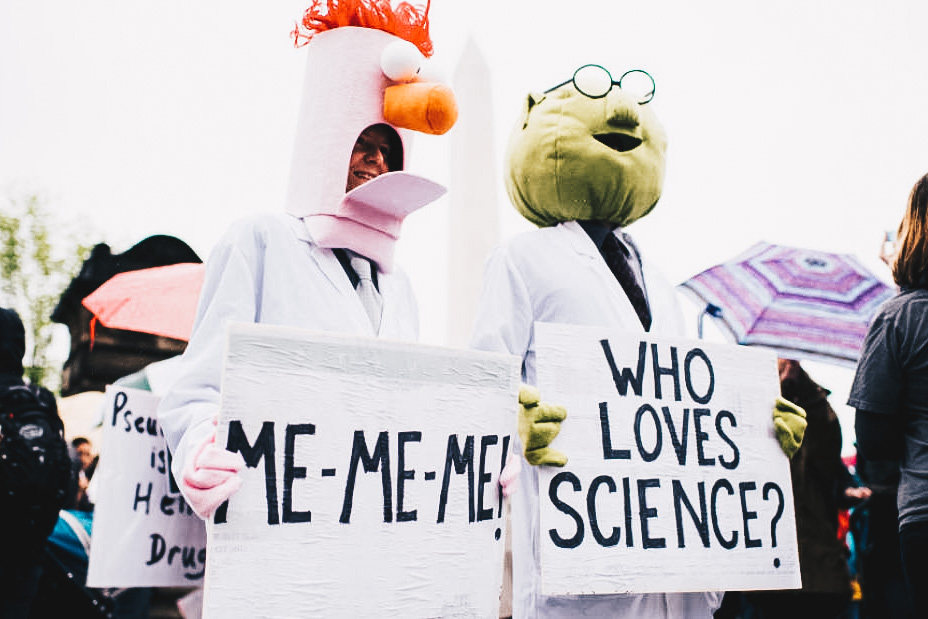In the wake of the Trump administration’s defunding of scientific research and ignorance-based policies, the people stirred. Like the women who marched before, Earth Day provided the clarion call for the scientific Resistance.
To the scientist (professional or hobbyist), self-proclaimed nerd, climate change activist and devoted follower of IFLS – I’ve long considered myself one of your brethren.
But I cannot bring myself to march with you.
While I’m most impressed with the witty posters hogging the headlines, I question if those marching for science have any idea what they’re really marching for. It’s almost artistic, but it all seems tremendously … unscientific.
Call me cynical, but in this post-truth culture, “scientific” voices now sound like they’re driven not by the quest for truth, but by personal agenda.
All that is happening now in the name of Science runs against the very ideals of scientific philosophy.
The empirical method was a sword to cut through myth, mystery and deception. Not to rebel or destroy, but – like sonar in a fog – to clear our consciences that we may follow it with more conviction.
Science should neither rewrite our mission nor recalibrate our compass. It simply fills in the details, where we once believed the Kraken roamed, ships fell off the Earth’s edge and the moon was an evil enchantress.
Free from political or philosophical ideals, science was an arena where everyone played by the rules of rationality. But while truth is the undisputed goal of science, science doesn’t necessarily point to truth.
A scientist must be prepared for perceived truth to be constantly challenged, revised and theorised.
While truth is the undisputed goal of science, science doesn’t necessarily point to truth. The power of science was that it bore no allegiance to a worldview, only to reason. It followed evidence.
Remember, when you were young, the accepted wisdom was that egg yolks were unhealthy? That’s been refuted; the consensus changes every couple of years, but over time our understanding grows. The same goes for theories of gravity, evolutionary thought and models of our most beloved atoms.
What we learnt in school wasn’t set in stone. (Poor Pluto!)
The power of science was that it bore no allegiance to a worldview, only to reason. It followed evidence. It can be challenged by anyone, anyone, with a strong reasonable case. But the best scientists acknowledged a philosophical edge to reason, beyond which even science had no authority. They played by the rules.
Apart from the limitations of good science, we forget that science, like anything else devised by humans, can be abused.
Most don’t realise that the strongest criticism of the scientific community came not from the Trump administration or uneducated conservatives, but from scientists themselves.
If you know the game, you can play it: Research can be cherry-picked. Stats can be or manipulated to deceive pseudo-statisticians with blind faith in p-values. Even the peer-review system is troubled.
Academics facing great pressure to publish are at risk for misconduct, lest they lose their tenure or funding. Capitalists from large pharmaceuticals and technological firms have been known to invent problems/illnesses to which they have novel solutions – that come at a price. Criminals aware of forensic methodology can cover their tracks.
Add in the hype of social media and you have a recipe for disaster. Think 30-second Instagram videos talking about the latest diet fad or oxygenated water “proven” by Science, absorbed by opiate masses who speak the language but don’t fundamentally understand the game.
We all lose. Science as a whole loses credibility among the masses while earnest scientists lose vital support for their research and political influence. A fierce battle to “fix” the system is being fought internally, but what we have now is a sensational scientific community far from its original ideals.
But the recent march for science highlights a greater irony: Truth is nowhere in sight. Instead, science is now a political loudspeaker in a scientifically illiterate world.
The danger is in inflated perceptions of our own intelligence. In our information age we think we’re scientific (thanks, Google!) … but we’re not. We’ve been schooled in rhetoric – not science.
Despite “science” hogging the headlines and the latest “proof” going viral on social media, ours is a largely a culture of zero
intellectual rigour, with Science (intentional caps) attaining an unquestionable religious cult status. The American physicist
Richard Feynman called this “cargo cult science“.
More people speculate whether Darwin re-embraced Christianity on his deathbed than those who’ve ever read Origins. The same goes for other prominent personalities.
In our information age we think we’re scientific (thanks, Google!) … but we’re not. We’ve been schooled in rhetoric – not science.
There’s good science (objective and honest), and bad (science fiction, scientific fraud, sensationalism and agenda-pushing). Bad science, like fake news and speculation, can solidify subjective worldviews through confirmation bias and other cognitive traps.
While real scientists should feel compelled to fight against ignorance, it seems their cause has been hijacked by something far more insidious: Scientism.
Defined by philosopher Tom Sorell as “putting too high a value on natural science in comparison with other branches of learning or culture”, scientism is symptomatic of intellectual pride. To its supporters, Science is the only source of knowledge.
Besides being epistemologically weak and unjustifiable, when such dogma is expressed in popular scientific literature, the lines between philosophical speculation and evidence-based science are blurred. Scientism is killing real science.
“The health of science is in fact jeopardised by scientism, not promoted by it. At the very least, scientism provokes a defensive, immunological, aggressive response from other intellectual communities, in return for its own arrogance and intellectual bullyism. It taints science itself by association.” – Physicist Ian Hutchinson
So clearly, it’s not just policy we marching against. While many truly march (ironically) for science, others claiming intellectual superiority march against an entire system of politics, ethics, religion and culture labelled conservative, bigoted and outdated.
They’re really marching for entitlement – and the chance to silence the opposition.
People mostly only like “science” or become “scientific” when it supports their views.
Whether in Buzzfeed, the church, humanist literature, and (ironically) in peer-reviewed journals, the science of science communication reveals a psychological phenomenon: Studies suggest that increased knowledge and literacy don’t necessarily result in the same universal “correct” conclusion.
What psychologists call “the backfire effect” shows why marchers who march for scientific literacy march in vain.
It seems that despite the unshakable faith of great thinkers before us, scepticism isn’t always a single, clear road. Instead, it gives us a nitro boost to blaze along the roads we’re already committed to.
So the next time you feel like sharing a link with a headline along the lines of “science says”, “science proves” or “because Science”, stop. Blind sharing and poster-waving reinforces the post-truth culture that silences the cause your brethren march tirelessly for. They will march for many more years.
If you believe in real science, you have a duty to truth.
And there is no room for charlatanism in science; you must personally honour the rules you champion.
Read the fineprint. Do the research. Verify method, and if conclusion flow from results. Explore similar research with contradictory findings. It’s your responsibility to rigorously sieve real science from sensationalist propaganda, to present data as it is, no matter how vapid or uninspiring.
So we start today by checking our own patronising eyes for planks, and clothing ourselves with sobriety. Then we let Truth – scientific or otherwise – speak for itself.









